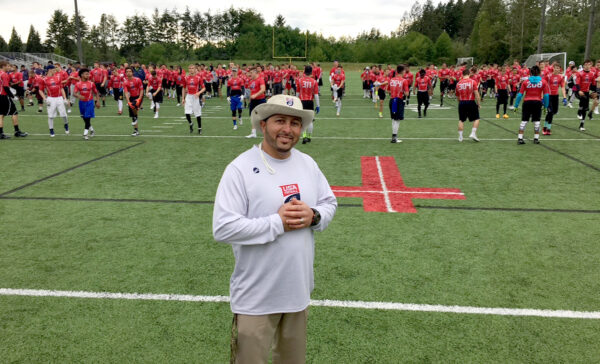Technology has the power to both help and harm efforts to address climate change. This is especially true for artificial intelligence, which has many applications for aiding climate solutions but also comes with a growing environmental footprint of its own.
According to a report released by the U.S. Department of Energy in 2024, energy usage from data centers is expected to double and even triple by 2028 — accounting for roughly 6.7 to 12% of the nation’s total electricity.
Darren Nguyen, Harsh Malik and Vishnuvardhan Kandala, three undergraduate students at the University of Washington Bothell who aspire to go into tech careers, envisioned a greener future for AI during a hackathon event last academic year.
“As people in tech, I feel that we have a responsibility because we understand how technology can contribute in a positive way but also contribute to environmental harm,” said Malik, a 2025 graduate who majored in Data Visualization and minored in Computer Science & Software Engineering. “We know that it can be a driving change, but if we don’t take the lead in solving these problems, then who will?
“We believe that tech isn’t just about writing code or building tools. It’s about creating impact. It’s about using our skills to make systems smarter, greener and more equitable.”
Addressing issues close to home
Malik and Kandala first met at Highland Middle School in Bellevue, Washington. Growing up in such a lush, green state, Kandala said they’ve always had an appreciation for nature. Over the years, they’ve also witnessed the summers getting hotter and the smoke from wildfires impacting the air quality.
“Seeing that pollution creeping in, it really hit home for us because we are both originally from India,” said Kandala, a junior majoring in Data Visualization. “He’s from Delhi, and I’m from Hyderabad, and those are both cities that face major air pollution challenges. We’ve seen what humans can do to a place — and we’ve realized that protecting the environment isn’t optional, it’s urgent. It’s a future problem that’s happening right now, and we want to be part of the solution.”
Although they didn’t plan to go to the same college, they were both drawn to UW Bothell for its smaller campus size and its degree pathways to tech careers.
“We’ve been in the same classrooms for more than a decade,” Kandala said. “Someday we hope to be in the same conference room, too.”
Malik first met Darren Nguyen, a senior also majoring in Data Visualization, while in class together. Nguyen, too, shared a passion for how data can be used to effect positive change.
“My professional goals are to pursue roles in data analytics and science with an interest toward health care and sustainability,” Nguyen said. “As a student in the Data Visualization major, I’ve gotten to see the real-world impacts that data has on people and how it can make change for the better.”
“We believe that tech isn’t just about writing code or building tools. It’s about creating impact. It’s about using our skills to make systems smarter, greener and more equitable.”
Harsh Malik, Data Visualization ’25 with minor in Computer Science & Software Engineering
Working to save the world
In the course “Advanced Data Visualization,” Malik and Nguyen teamed up on a project that used geographic information system mapping to analyze disparities in Seattle’s electric vehicle charging infrastructure. The goal was to identify underserved areas and recommend strategic locations for new public charging stations.
“What I have enjoyed most about my time at UW Bothell is the opportunity to engage in hands-on, interdisciplinary projects that connect technology with real-world impact,” Malik said. “I particularly enjoyed working on data-driven sustainability projects, which reinforced my passion for using technology for the public good.”
The three of them first joined forces as a group at the annual hackathon event sponsored by Avanade, a global professional services company. The 2025 theme, “UWB Hacks: Save The World!,” invited students to unleash their inner hero and unite to solve some of the planet’s biggest problems. The trio looked to address AI’s energy dilemma.
“It’s concerning that most people don’t have the background information about something that’s being used every day in their lives,” Malik said. “It takes 519 milliliters to cool down the data centers and about 2.9 kilowatt hours per prompt. What we’ve created is something that’s better for the environment.”
One of the primary factors contributing to AI’s high energy usage is the sheer volume of data that is analyzed and then synthesized to create a response to each question or prompt the user inputs. As anyone who has used a generative AI model such as ChatGPT knows, the user typically gets a lot more information than they’re asking for, Kandala said.
Their solution? Green AI: An environmentally conscious alternative that improves energy and water usage in AI models.
Creating a more sustainable option
Green AI uses lighter, more efficient models that provide shorter answers — which lowers electricity and water use each time someone makes a request. It aims to provide responses that are 80% shorter without sacrificing speed, the team reported, making it not only more sustainable but also more accessible.
“Small tweaks at the code level can lead to giant impacts globally,” they noted in their presentation.
By the end of the three-day event, the team had a working prototype that allows users to turn on a green mode that provides shorter responses. The team also went beyond the technical aspects of the app to incorporate a business model that incentivizes people to use the green mode through a points-based reward system — allowing users to earn points and redeem them to donate a water bottle, plant a tree or even get cash back.
The team also believes the app can help spread awareness about the environmental impacts of AI and encourage people to use the technology more intentionally.
According to a 2024 study by Carnegie Mellon University and AI startup Hugging Face, generating a single image using AI takes as much energy as charging a phone to full power. “I hope that people realize the harm they’re doing by using AI just for fun,” Kandala said. “They need to realize the impact they have and reduce their carbon footprint to save the world.”
In addition to creating greener technologies, the team also expressed a desire to support change at a federal policy level to curb AI’s resource impacts.
Jumpstarting careers in tech
At the hackathon, Green AI was awarded the Student Favorite Prize. The project also caught the eye of one of the judges, Neha Srivastava, co-founder of Future Force, a startup that connects innovators with the resources they need to make positive change.
Impressed by the students’ work, she offered them internships, which they’re currently completing.
“For the first Hackathon I’ve ever done, I’m surprised that this project went this far and the outcome is still going on,” Nguyen said. “It has opened up so many connections that I would have never thought possible in my first year at UW Bothell, and I’m glad to have made so many friends and connections in my final year.”
The trio also presented the project at UW Bothell’s Innovators Hub, attracting attention from potential investors.
“This project has opened a lot of doors for us,” said Malik, who is now pursuing a graduate degree in Computer Science & Software Engineering at UW Bothell. “A couple of venture capitalists have already expressed interest and are willing to provide the infrastructure needed to bring the idea into a more advanced and impactful shape.”
“This internship and continued education represent meaningful next steps in my journey, and I look forward to creating technology that makes a positive difference in the world.”



